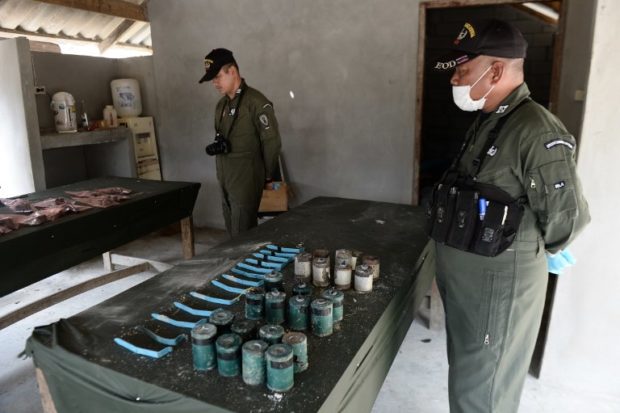Spike in bomb and grenade attacks in Thailand’s restive south

Thai bomb squad members inspect explosive devices following a bomb attack at a civilian volunteer base by suspected separatists the night before, in the Rangae district in the southern province of Narathiwat on December 29, 2018. AFP
BANGKOK, Thailand — Junta leader Prayut Chan-O-Cha decried “opportunists” on Saturday after a wave of coordinated bomb attacks by suspected insurgents hit Thailand’s Muslim-majority “deep south” in the lead-up to the New Year holidays.
The region bordering Malaysia has been in the grip of a low-level but bloody insurgency for more than a decade as ethnic Malay militants battle the Buddhist-majority state for greater autonomy.
Since 2004, insurgents armed with homemade bombs and grenades have clashed with Thailand’s powerful military, killing nearly 7,000 people, mostly civilians, of both Muslim and Buddhist faith.
However, 2017 saw a record low of 235 people killed in clashes.
The latest attacks occurred Friday night in a series of seven separate incidents in three different districts of Narathiwat province, said police commander Major General Dussadee Choosungkit.
Article continues after this advertisementTwo bomb attacks occurred in Sri Sakhon district, four in Chanae district, and militants “ambushed a base in Rangae district” using grenades, he said.
Article continues after this advertisementThe homemade bombs were “detonated by radio”, he said, adding that no one was injured.
The attacks prolong a bout of violence that began late Monday evening when a policeman died in an explosion from a detonated roadside bomb hidden in a gas cylinder.
In nearby Songkhla province on Wednesday night, two bombs rocked popular tourist site Simila beach, causing no fatalities but damaging to two seaside statues.
Songkhla provincial police are still investigating the beach bombings, and no arrest has been made, police told AFP Saturday.
Major General Dussadee said the Songkhla bombings were not connected to his province’s troubles — which he said is payback for a December 12 raid on the insurgents’ camp in Narathiwat.
“I think the militants are retaliating at authorities after the raid on their camp earlier this month,” he told AFP.
Junta leader Prayut Chan-O-Cha has instructed officials to step up security measures after the attacks, said government spokesman Buddhipongse Punakanta Saturday.
“(Prayut) called them the works of ill-intentioned people and opportunists for staging attacks during New Year holidays,” said Buddhipongse, adding that the junta head asked for locals to “tip off” authorities on any irregularities.
The three southernmost provinces — Narathiwat, Yala and Pattani — are predominantly Muslim and have long chafed against Bangkok’s rule, calling for greater autonomy or independence.
The latest attacks come as the Thai junta renews talks with an umbrella group claiming to represent the rebels, with the aid of Malaysia as facilitator.
The shadowy Barisan Revolusi Nasional faction is believed to be behind most of the violence in the region, with its leadership living along Malaysia’s border. /ee